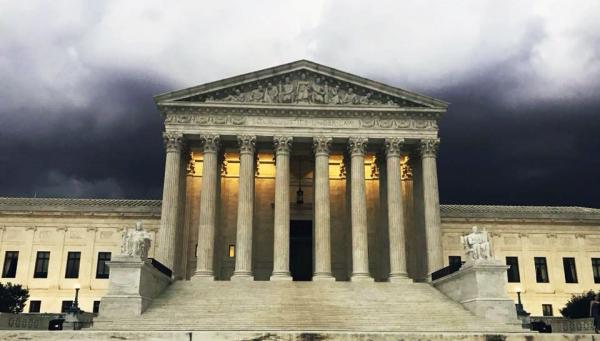KID REPORTERS’ NOTEBOOK
A New Justice Is Sworn In


Amy Coney Barrett’s confirmation just days before a presidential election is likely to cast a long shadow over the Supreme Court.
On October 26, Amy Comey Barrett was sworn in as an Associate Justice of the United States Supreme Court, the highest court in the land. “The oath that I have solemnly taken tonight means at its core that I will do my job without any fear or favor, and that I will do so independently of both the political branches and of my own preferences,” Barrett said at an evening ceremony on the South Lawn of the White House.
A professor at Notre Dame Law School in Indiana, Barrett most recently served as a circuit judge on the U.S. Court of Appeals for the 7th Circuit. She replaces Ruth Bader Ginsburg, who died in September. Ginsburg served on the Court for 27 years, becoming a towering figure in the law who blazed a trail for women’s rights.
President Donald Trump’s nomination of Barrett was controversial for several reasons. It came before Justice Ginsburg’s burial, and at a time when Americans across the country have begun to cast their ballots for the presidency. Trump, who is a Republican, is running against Democratic challenger Joe Biden. Because of the coronavirus pandemic, voters are using mail-in ballots in record numbers ahead of Election Day, which is November 3.
The focus on Barrett’s candidacy also meant that the Senate would not be providing an economic relief package before the election. Millions of Americans are struggling financially because of the coronavirus pandemic and the shutdown of schools and businesses.

Truman interviews Lisa Eskow, a professor and Supreme Court expert at the University of Texas School of Law, via video.
AN “ACT OF BAD FAITH”?
Barrett was confirmed by a 52-to-48 vote in the Senate, making her the 115th Justice and only the fifth woman to serve on the Court. For the first time in 151 years, the vote was purely partisan, with no Democrats voting to confirm Barrett.
Senator Susan Collins of Maine was the only Republican to vote against Barrett, saying that the winner of November’s election should be the one to nominate Ginsburg's replacement. Democratic lawmakers, and many voters, agreed.
“The American people will never forget this blatant act of bad faith,” said Senate Minority Leader Chuck Schumer, a Democrat from New York. He called the Republican vote to confirm Barrett “one of the darkest days” in the history of the Senate. Democrats fear that Barrett’s conservative views could adversely affect decisions involving women’s rights, civil rights, and affordable health care.
“UNPARALLELED ABILITY AND TEMPERAMENT”
The nine Justices of the Court preside over cases that could not be decided in lower courts, Lisa Eskow, a professor and Supreme Court expert at the University of Texas School of Law, told me. They are appointed for a lifetime, Eskow said, “in part to remove the political process that comes with elections.”
Barrett is now the third Supreme Court appointment made by President Trump. Conservative Justices appointed by Republican presidents now hold a 6-3 majority.
In early 2016, when the death of Justice Antonin Scalia created a vacancy, Republicans refused to consider then-President Barack Obama’s nomination of Merrick Garland.
“The Republicans in the Senate at that time argued that, because it was an election year, the President who won the election later that year should fill the empty seat, and therefore confirmation proceedings should not proceed,” Eskow said. “Many of those same Senators are now taking the opposite position, rushing through Judge Barrett’s nomination and confirmation before the 2020 presidential election.”
Senate Majority Leader Mitchell McConnell, a Republican from Kentucky, stood by his push to confirm Barrett, calling her “a woman of unparalleled ability and temperament.”
